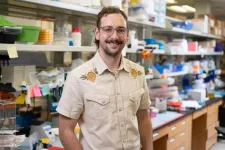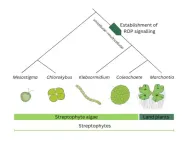(Press-News.org) MADISON – Nineteen million years ago, during a time known as the early Miocene, massive ice sheets in Antarctica rapidly and repeatedly grew and receded. The Miocene is widely considered a potential analog for Earth's climate in the coming century, should humanity remain on its current carbon emissions trajectory.
Identifying how and why Antarctica's major ice sheets behaved the way they did in the early Miocene could help inform understanding of the sheets' behavior under a warming climate. Together, the ice sheets lock a volume of water equivalent to more than 50 meters of sea level rise and influence ocean currents that affect marine food webs and regional climates. Their fate has profound consequences for life nearly everywhere on Earth.
While fluctuations in Antarctica's ice sheets have, over the span of millions of years, grown and diminished at regular intervals tied to natural oscillations in Earth’s journey in orbit, researchers at the University of Wisconsin–Madison and their collaborators around the world have uncovered evidence that Antarctica's ice sheets grew and shrank more frequently during the Miocene epoch than was previously known.
This new evidence, published recently in the Proceedings of the National Academy of Sciences, indicates that between about 19.2 and 18.8 million years ago, the ice sheets grew and receded multiple times over cycles of just a few thousand years. That is much more rapidly than can be explained by periodic shifts in the planet’s orbit and rotational axis, known as Milankovitch cycles, which typically advance slowly, altering Earth's climate and ice sheets over tens or hundreds of thousands of years.
"Our observation of this rapid volatility of the Antarctic ice sheets raises the interesting question of what's causing it," says Nick Sullivan, a 2022 UW–Madison PhD graduate who led the analysis for his dissertation research.
The study offers an unprecedented window into the sheets' past behavior, and it relies on a well-preserved sediment record from the Antarctic Drilling Project, or ANDRILL. The project was an international scientific collaboration to gather evidence of past climatic conditions via sediment and rock drilled from hundreds of meters below the Antarctic seabed.
In 2006 and 2007, drilling in McMurdo Sound off the coast of Antarctica in an area influenced by both of the continent's large ice sheets recovered detailed sediment records from the Miocene, close to the ice sheet.
“We could clearly see the influence of long-term climate cycles on ice sheet extent in the rock and sediment cores we recovered in 2007, but our initial observations weren’t detailed enough to detect shorter-term changes,” says co-author Richard Levy, a professor at Victoria University of Wellington and principal scientist at GNS Science, a public research institute in New Zealand.
The latest analysis led by Sullivan now allows scientists to “document past ice sheet change on timescales as short as five centuries or so,” says Stephen Meyers, a UW–Madison geoscience professor who worked with Sullivan in his analysis.
In fact, Meyers calls it a remarkable archive.
That’s because it contains small bits of gravel that fell to the seafloor as icebergs drifted away from the ice sheets after breaking away. The amount of gravel in ocean sediment records ice sheet changes, such as when the edge of an ice sheet gets closer to or further away from that particular part of the seafloor.
While testing for evidence of Milankovitch cycles within the sediment, Sullivan found variations in the abundance of gravel, suggesting nearby ice sheets advanced and retreated in recurring intervals as brief as 1,200 years.
It's unclear what triggered the ice sheets to advance and retreat at these geologically frequent intervals, but the team proposes several potential causes based on prior studies of ice sheets.
One idea suggests that the ice sheets, building up over time, became steeper and top heavy, leading them to collapse. Another proposes that as thick ice sheets advanced over rough terrain, heat from friction helped to temporarily speed them up.
"There are likely multiple mechanisms that were going on and interacting with each other," says Sullivan, including variations in the local climate and the ocean.
Scientists around the world are working to better understand the many factors beyond Earth’s orbit that control ice sheet behavior as the planet continues to warm. The early Miocene isn’t perfectly analogous to today’s world, but the new study suggests Antarctica's ice sheets could change rapidly and in unexpected ways in the coming centuries if carbon dioxide levels and temperatures continue to rise due to anthropogenic greenhouse gas emissions.
“It was long thought that Antarctica’s ice sheets remained large and stable over long periods of time. But the closer we look, the more we realize just how sensitive the ice sheets are to environmental change,” says Levy. “This insight is key as we consider the pace at which we need to adapt to future sea level rise driven by melt and retreat of our planet’s ice sheets.”
# # #
– Will Cushman, wcushman@wisc.edu, 608-263-1986
END
(MEMPHIS, Tenn. – November 30, 2023) Immunotherapy using modified chimeric antigen receptor (CAR) T cells has greatly improved survival rates for pediatric patients with relapsed and recurrent leukemia. However, these therapies are not as effective in treating solid tumors and can have significant toxicity. Findings from St. Jude Children’s Research Hospital showed that adding a modular chimeric cytokine receptor to CAR T cells increased their efficacy in multiple solid tumor models. The study was published today in Nature Biomedical Engineering.
“We designed modular chimeric cytokine receptors and showed that ...
Melting of glaciers, rising sea levels, extreme heat waves: the consequences of climate change are more visible than ever, and the scientific community has confirmed that humans are responsible. Yet studies show that a third of the population still doubts or disputes these facts. The cause is disinformation spread by certain vested interests. To try and prevent this phenomenon, a team from the University of Geneva (UNIGE) has developed and tested six psychological interventions on nearly 7,000 participants from twelve countries. The research, published in ...
Skin-to-skin contact between parent and infant during the first hours after a very premature birth helps develop the child's social skills. This is according to a new study published in JAMA Network Open by researchers from Karolinska Institutet and others. The study also shows that fathers may play a more important role than previous research has shown.
In current practice, very premature babies are usually placed in an incubator to keep them warm and to stabilize them during the first hours after birth. In the “Immediate parent-infant skin-to-skin study” (IPISTOSS), 91 premature babies born at 28 to 33 weeks were randomized to either ...
Plants regulate their development with a distinct group of molecular players. ROP proteins, a group of plant-specific proteins, are known to control plant tissue formation. Now, Hugh Mulvey and Liam Dolan at the GMI show that ROP proteins evolved at the transition between unicellular and multicellular plant life. The findings are published on November 30 in the journal Current Biology.
Being non-mobile, plants follow a very different lifestyle from us animals. To grow and develop, plants also need a distinct ...
In a study with 22 pairs of identical twins, Stanford Medicine researchers and their colleagues have found that a vegan diet improves cardiovascular health in as little as eight weeks.
Although it’s well-known that eating less meat improves cardiovascular health, diet studies are often hampered by factors such as genetic differences, upbringing and lifestyle choices. By studying identical twins, however, the researchers were able to control for genetics and limit the other factors, as the twins grew up in the same households ...
MIT geologists have found that a clay mineral on the seafloor, called smectite, has a surprisingly powerful ability to sequester carbon over millions of years.
Under a microscope, a single grain of the clay resembles the folds of an accordion. These folds are known to be effective traps for organic carbon.
Now, the MIT team has shown that the carbon-trapping clays are a product of plate tectonics: When oceanic crust crushes against a continental plate, it can bring rocks to the surface that, over ...
About The Study: In this study of 3 million U.S. adults, anxiety and depression were significantly higher among adults ages 18 to 39 compared with adults age 40 and older during the COVID-19 pandemic. Less favorable economic conditions and responses to social upheaval may have contributed to young adults’ worse mental well-being. These findings suggest a need for greater mental health care and economic policies targeted toward younger adults.
Authors: Sarah Collier Villaume, Ph.D., of Northwestern University in Evanston, ...
About The Study: The findings of this study suggest that structural racism must be considered as a fundamental contributor to the unequal distribution of lung cancer risk factors and thus disparate lung cancer risk across different racial and ethnic groups. Additional research is needed to better identify mechanisms contributing to inequitable lung cancer risk and tailor preventive interventions.
Authors: Sidra N. Bonner, M.D., M.P.H., M.Sc., of the University of Michigan in Ann Arbor, is the corresponding author.
To access the embargoed study: Visit our For The Media website ...
A new analysis of the brain activity of people with post-traumatic stress disorder (PTSD) is the first to reveal that traumatic memories are represented in the brain in an entirely different way than sad autobiographical memories.
This finding supports the notion that traumatic memories in PTSD are an alternate cognitive entity that deviates from regular memory, and may provide a biological explanation for why the recall of traumatic memories often displays as intrusions that differ profoundly from “regular” negative memories for patients with PTSD.
The study, ...
New Haven, Conn. — It is well known that people who have lived through traumatic events like sexual assault, domestic abuse, or violent combat can experience symptoms of post-traumatic stress disorder (PTSD), including terrifying flashbacks, severe anxiety, and uncontrollable thoughts about the incident. But what exactly happens in the brains of PTSD patients as they recall these traumatic events? Are they remembered the same way as, say, the loss of a beloved pet — or, for that matter, a relaxing walk on the beach?
A new study co-led by Yale researchers finds that the brain activity triggered by recollections of traumatic experiences ...



